Towards an Anti-Fascist International: A View from Central and Eastern Europe
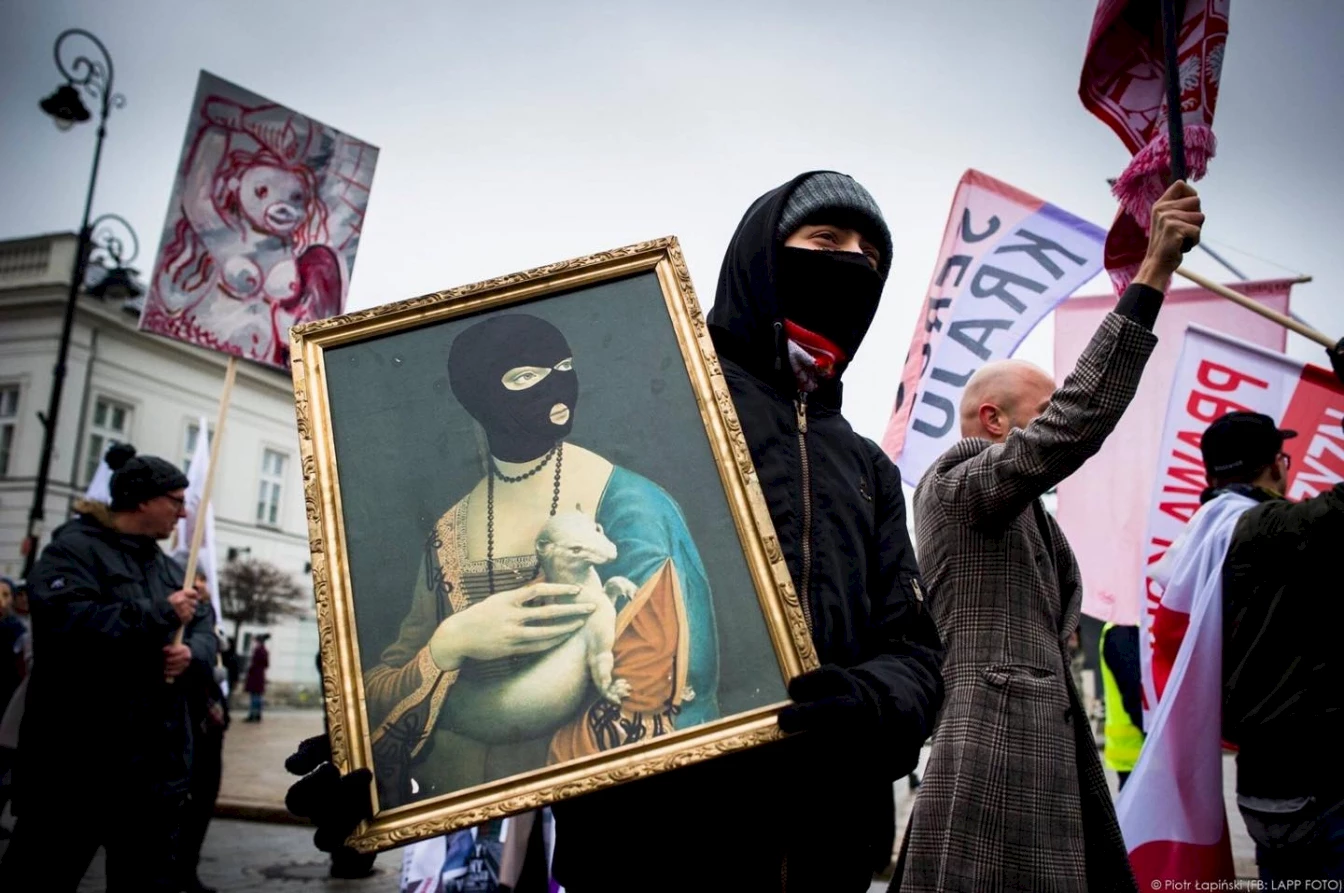
Performance Strike painting by Arek Pasożyt during the March of 100 Flags organised in commemoration of the 100th anniversary of women's vote, Warsaw 2018. Photo: Rafał Żwirek.
As way of response to the theme of the current issue of L'Internationale Online, which explores the trajectory from colonial pasts to contemporary forms of fascism, I would like to consider two histories from the geopolitical position of Central and Eastern Europe. I wish to argue for forms of artistic internationalism which can combat recurrent fascism by envisioning and materialising democratic, equalitarian and decolonial models of alter-globality. Let's start with recalling a couple of basic facts regarding the Anti-Comintern Pact, first signed between Nazi Germany and Japan in 1936. Other European states, both independent and ancillary such as Bulgaria, Croatia, Finland, Hungary, Italy, Romania, Slovakia, Spain, Turkey and occupied Denmark, joined the pact later and before 1941. Some were directly involved in the military struggle of the Axis powers against the Allied forces during World War II.
Firstly, the Anti-Comintern Pact was a political and military alliance, initially formed against the Communist International (Comintern), and more specifically against 'The People's Front of Struggle against Fascism and War', a policy adopted by the Comintern in 1935 in wake of the Spanish Civil War. The signatories of the pact declared that 'the toleration of interference by the Communist International in the internal affairs of the nations not only endangers their internal peace and social well being, but is also a menace to the peace of the world' (Presseisen, 2013, p. 237) – even this short passage is a chilling read for anyone who advocates for progressive forms of internationalism as the same rhetoric is used today in right-wing propaganda worldwide.
Secondly, the Anti-Comintern Pact was joined by many regional nations of Central Europe who were not colonial superpowers, some of which did not even exist in the nineteenth century at the peak of European colonialism. And yet most expressed imperial ambitions. Slovakia wanted to become Great Slovakia; Bulgaria, the Great Bulgaria; Romania, the Great Romania; Croatia, the Great Croatia. This sentiment was further shared by nations who did not partake in the pact: imperial and colonial fantasies were cultivated in such places as Poland, Greece and Serbia, all stern adversaries of the Nazis. Overall, Europe spawned many forms of racism, nationalism and fascism despite the colonial 'achievements' of particular nations. If anything, many European iterations of pre-war fascism could be called catch-up colonialism or intra-European imperialism as even peripheral or semi-peripheral signatories of the Anti-Comintern Pact followed brutally racist policies of social cleansing and territorial expansion as well as the mass murder of European Jews, six million of whom were killed during the Holocaust.
I am referencing these facts to signal the need to reflect upon the peripheral, 'non-West' iterations of fascism: Poland being a case in point of an aspirational nation which is still-not-yet-as-Western-as-it-would-love-to-be. The histories of Central and Eastern Europe are tragic proof that colonialism, imperialism and racism can be directed by anyone and towards anyone, whatever the colour of their skin, against Jews, Poles, Armenians, Bosnians, Bulgarians, Greeks, Macedonians, Russians, Serbians, southern Italians, Ukrainians, etc. This 'geopolitical position' also proves that being subjected to racial discrimination does not produce paragons of anti-racism. Unfortunately, victims of such abuse can easily descend into a vicious cycle of violence and easily become perpetrators themselves. Contrary to what Frantz Fanon imagined in The Wretched of the Earth (1961/2004), the baptism of blood is not purifying and all too often conflict breeds conflict, racism engenders racism.
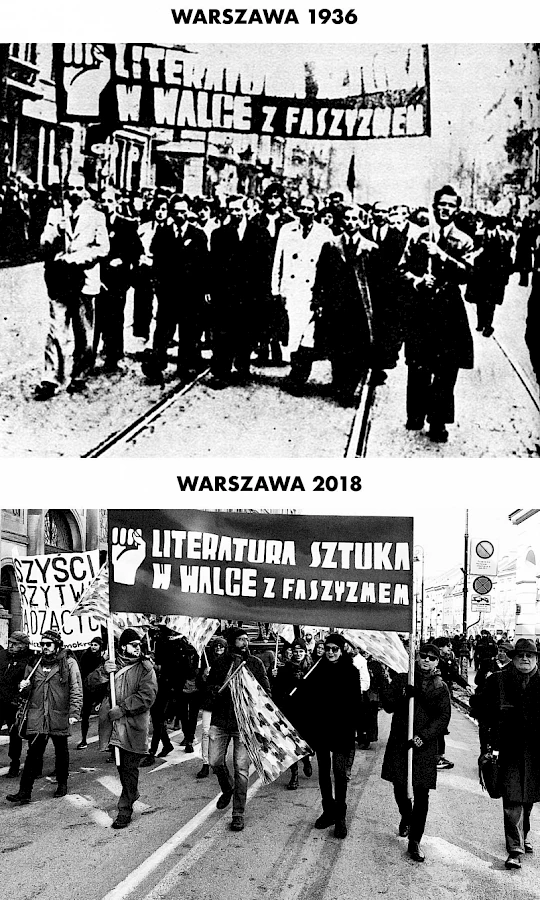
Art and Literature against Fascism, Warsaw 1936–2018, collage by Witek Orski.
I am genuinely perplexed while reading current statistics concerning xenophobia in Poland. The same nation who experienced racial abuse for generations is not particularly welcoming of refugees and seasonal workers. In 2018, 60 per cent of Poles were unconditionally against accepting refugees from war-torn countries, compared to 20 per cent in 2015 (Bożewicz, 2018): that's a 40 per cent difference resulting from the recent wave of xenophobic and racist propaganda distributed by right-wing media and amplified by its echo chambers. But one does not need to read the records or any sociological report to observe how the recurrence of abuse operates on a daily basis. Living in Warsaw, it is just enough to go shopping.
A few days ago, while writing this text, I walked past a local supermarket. A group of young men were outside collecting signatures against 'restitution of Jewish property'. This coded anti-Semitic message was being propagated in broad, stark daylight, or at least tolerated, if not discretely supported by the right-wing government. This was happening in the city which witnessed the mass murder of its Jewish citizens only eighty years ago, a time when Polish people in general were brutally persecuted.
Yet, this is not specific to Central Europe. On the contrary, recurrent fascism is a global phenomenon. The metropolitan, semi-peripheral and peripheral fascisms are paradoxically similar. The special issue of FIELD: A Journal of Socially Engaged Art Criticism edited by Gregory Sholette, dedicated to art's relationship to anti-globalism and the neo-authoritarian turn, features reports from all over the globe which paint a worrying picture of the global backlash against democracy, equality and emancipation. To address the multifaceted nature of the global far-right, Sholette decided to use the terms 'neo-authoritarianism' and 'neoreactionary nationalism' (2018). This decision is understandable: even though the right-wing threat is not discussable, the historical references to fascism might be misleading; it is tempting to simplify the complexities of our current predicament by reducing it to Europe of the 1930s, which is also usually understood in a rather simplified manner. By discussing neo-authoritarianism, the issue follows the distinction made by Enzo Traverso between neo-fascists and post-fascists (2019). As Traverso argues, most of the current right-wing movements are not 'neo-fascist', directly continuing in the legacy of state fascism, but rather 'post-fascist', sharing similar philosophical inspirations, but differing in the means of how to win power and forge statehood: consider the Hungarian model of 'illiberal democracy', for example. But such theoretical distinctions are ahistorical and do not account for the messy reality of fascist movements before they strengthened their grip on power – it does not seem that we are at this point again yet, luckily.
The question remains, why should we discuss fascism at all? Hannah Arendt posits in The Origins of Totalitarianism that an attempt to comprehend reality has to be motivated by the duty to face it. Just as she writes in her preface:
The conviction that everything that happens on Earth must be comprehensible to man can lead to interpreting history by commonplaces. Comprehension does not mean denying the outrageous, deducing the unprecedented from precedents, or explaining phenomena by such analogies and generalities that the impact of reality and the shock of experience are no longer felt. It means, rather, examining and bearing consciously the burden which our century has placed on us – neither denying its existence nor submitting meekly to its weight. Comprehension, in short, means the unpremeditated, attentive facing up to, and resisting of, reality – whatever it may be. (Arendt, 1951/1973, p. viii)
From the specific geopolitical position of Poland one can quote Arendt only conditionally, however, as her historical thesis of totalitarianism, both of the Nazi and Stalinist strands, is too often instrumentalised in public debate to whitewash fascism and rebuke communism. While examining the burden of our century in a place like Warsaw, one should never deny the historical fact that it were the Nazis who established Auschwitz and the Soviet soldiers who freed it; even though Stalin betrayed the Popular Front by signing the Molotov-Ribbentrop Pact and destroyed the progressive aspects of the Communist International in a series of brutal purges. The fact remains that if it were not for the unholy alliance of Soviet Russia, colonial Britain and the imperialistic US, the Nazis would have won – and we would not be having this debate. Yet, levelling out and placing all sides of this conflict on the same platform risks serious slippage. It should be avoided at all costs, in my opinion. Same goes for the discussion about the role played by the colonial legacy in establishing fascism as it might suggest that both anti-fascism and fascism are two sides of the same colonial coin.
Speaking again from the position of Central and Eastern Europe, I advocate for a more nuanced debate, one which moves beyond a Western-centric view which risks negating the historical dimensions of anti-fascist struggles, commitments and sacrifices of millions of men, women, people of different ethnicities, political convictions and faiths. Antonio Negri interprets the anti-fascist mobilisation as the struggle of multitudes against the Nazi-fascist invasion, a victory won through the persistence of the self-organisation of Soviets rather than the sheer power of the Stalinist state (Negri, 2017).
Currently, I am affiliated with a group of people who have founded the Anti-Fascist Year, a coalition of artists, activists, intellectuals, informal collectives, artistic and academic institutions who are organising a widespread programme of anti-fascist events from September 2019–May 2020. Motivated by the moral and political responsibility of 'unpremeditated, attentive facing up to, and resisting of, reality – whatever it may be', the organisers of Anti-Fascist Year have decided to use a more direct reference to the legacy of fascism.
The Anti-Fascist Year define 'fascism' along the lines of the concept developed by Umberto Eco, who twenty years ago, even before Salvini or Trump, identified 'ur-fascism' (Eco, 1995) instead of discussing the differences between post- or neo-fascism. Ur-fascism is a recurrent tendency shared between both historical and existing fascisms, which are linked by family resemblance rather than logical coherency of their programmes. These variations share a similar set of values, a kind of attitude that cannot easily be isolated due to the eclectic and incoherent nature of fascism, but still, according to Eco, can and has to be identified. Such an amalgam of fascist traits includes: the cult of tradition; the rejection of modernism; the cult of action for action's sake; labelling disagreement as treason; fear of difference; appeal to social frustration; the obsession with plot; painting the enemy as both strong and weak; reverence of violence, machismo, cheap heroics; selective populism based on newspeak; contempt for truth, reason and artistic freedoms.
To address the current situation with the concept of ur-fascism is not to disregard history. For a historical materialist it is clear that fascism has its origins and sociopolitical conditions. But, on the other hand, it is a constant risk, an always present possibility of modern barbarism, a threat that continues despite historical victories over particular fascist regimes. And paradoxically, the global emergence of fascism signals that modernity with all its ills ceases to be a strictly European condition.
In June 2019 at the summit of Transunions, organised by Jonas Staal and the Warsaw Biennale, I heard Dilar Dirik, a feminist scholar affiliated with the Kurdish struggles for democracy and independence, name the Daesh as 'fascists'– it struck a proper chord. I immediately felt how appropriate this word can be. Daesh cannot possibly be called neo- or post-fascist, but somehow, due to a horrific family resemblance, the group is ur-fascist. Though, equally, such words as 'fascism' tend to be used all too often. Michał Kozłowski, a philosopher associated with Anti-Fascist Year, sensibly points out that although we should not label everything and everyone as 'fascist', degrading the term to the level of a swear word, but it is still utterly important for identifying fascism and the struggles against it (Kozłowski, 2019).
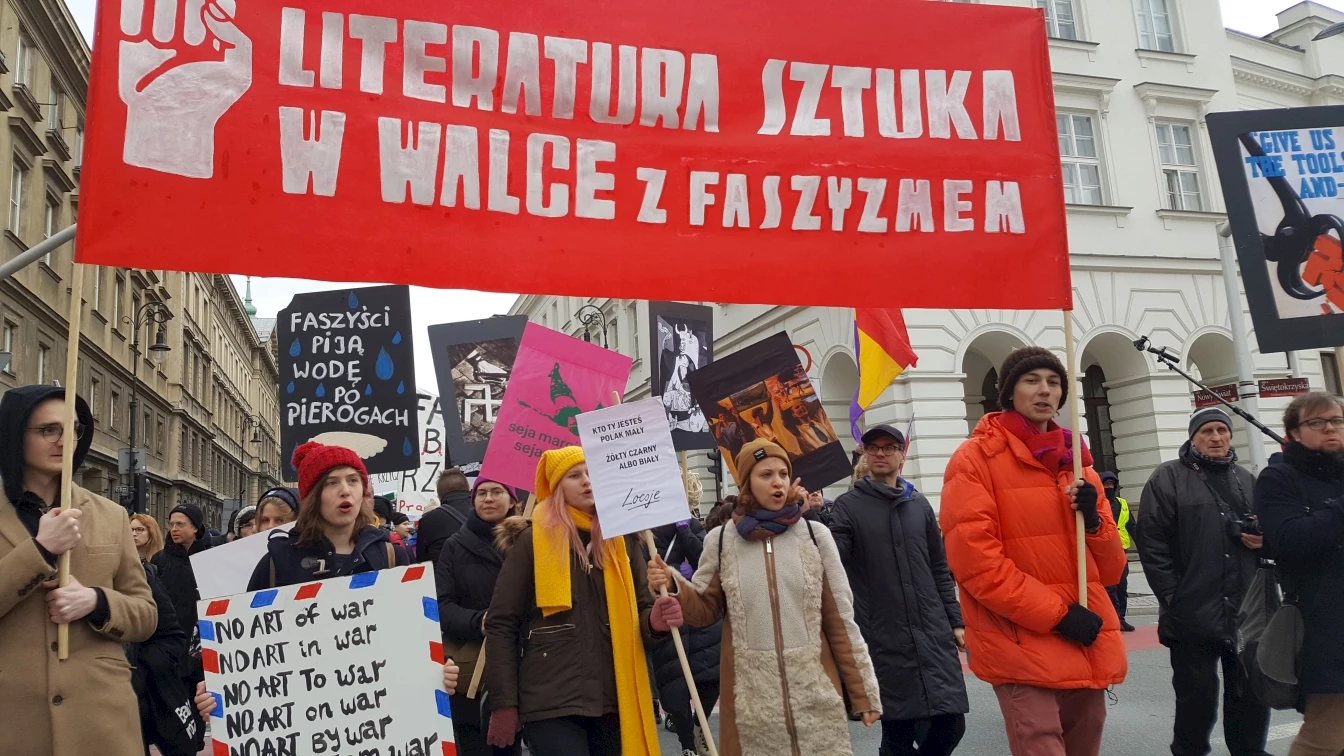
The Demonstration of Paintings at the march against racism and fascism, Warsaw 2019. Photo: Kuba Szreder.
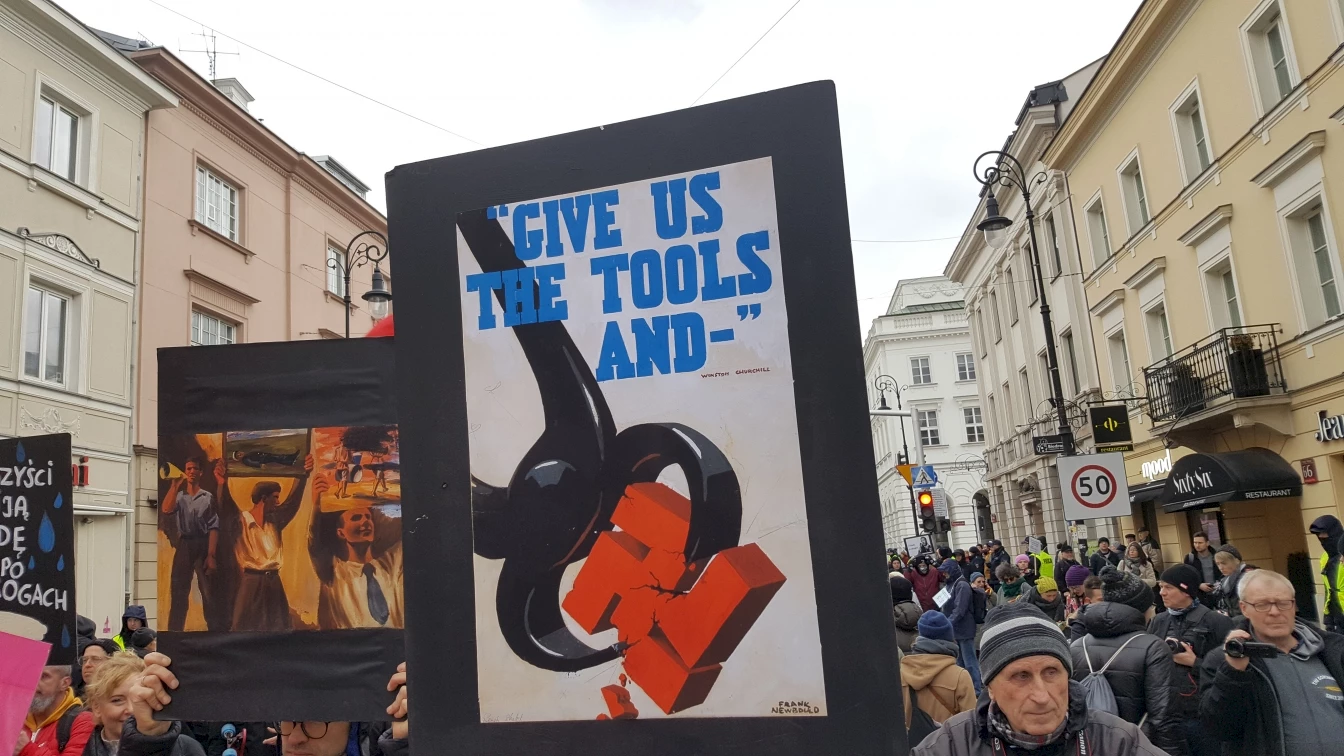
Give us the Tools and– at the march against racism and fascism, Warsaw 2019. Photo: Kuba Szreder.
The attempt to identify ur-fascism is driven by the need to address the brutal dictatorships and authoritarianisms which have emerged and still emerge in countries inside and outside of Europe regardless of their colonial legacy. It is a particularly contested topic in peripheral and semi-peripheral countries such as Poland, Hungary, Iran, Turkey and Russia. The self-victimisation of these nation states with their anti-Western thrust is a political strategy, which only legitimises local forms of authoritarianism. In Poland, for example, right-wingers tend to legitimise themselves by vilifying such Western 'fashions' as human rights, women's rights, LGBT+ rights, feminism, gender and queer studies, or even anti-racism or anti-fascism. They want to purify Poland from the 'Western corruption'. And rather absurdly for a country that for centuries has hovered on the brink of Europe, the right-wing fashions Poland in turn as a bulwark of real Europeanism (i.e. white Christianity), the destiny of which is to save the West from itself. This anti-Westernism is underpinned by anti-communism, anti-modernism and anti-intellectualism. Terms like 'cultural Marxism', 'international elites' or 'Frankfurt School' are not only anti-Semitic code words, they are employed to denigrate anyone who is not a vehement nationalist.
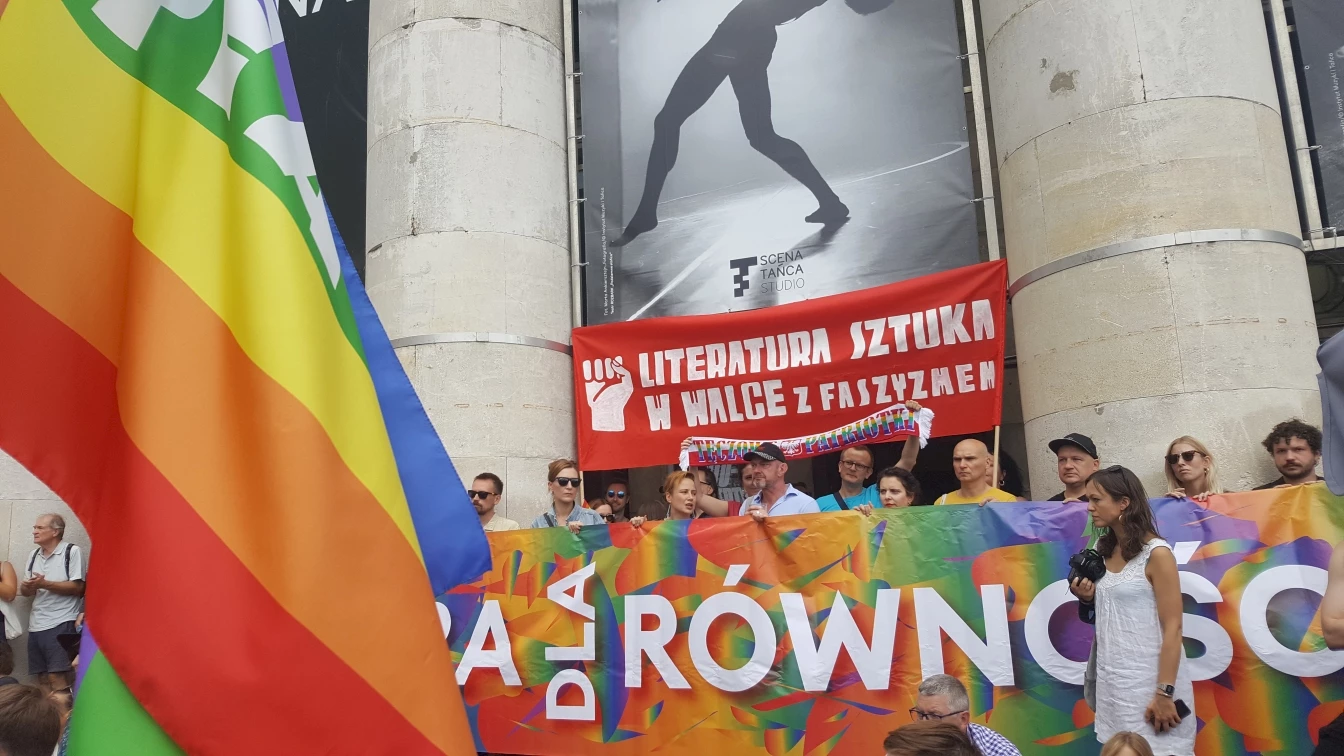
Art and Literature against Fascism & The Rainbow Patriots by Kasper Lecnim at the march organised in solidarity with the LGBT Pride in Bialystok brutally attacked by neo-fascist, Warsaw 2019. Photo: Kuba Szreder.
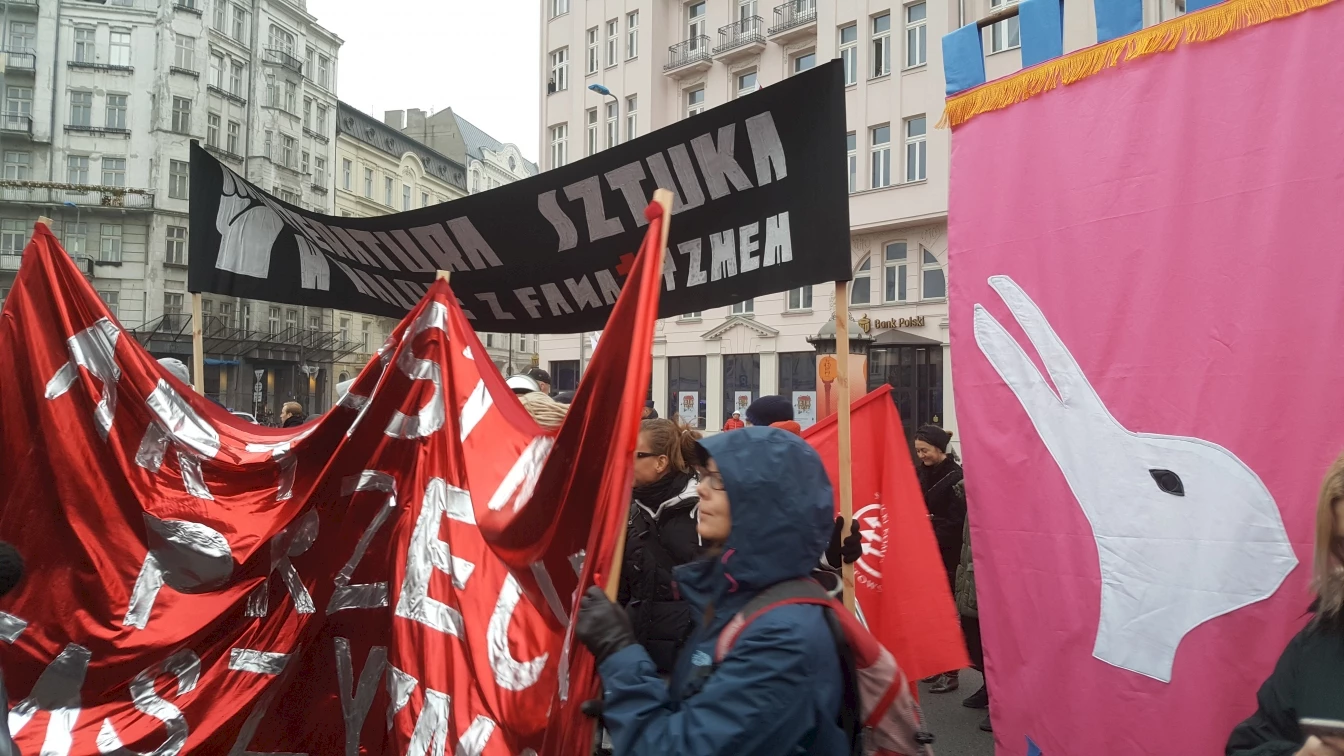
Art and Literature against Fanaticism at the annual anti-fascist demonstration, Warsaw 2018. Photo: Kuba Szreder.
Just by writing these words I could be labelled oikophobic: a psychiatric term originally meaning a phobia of home surroundings, a fear of home appliances; recently it has been recoded as 'traitors of the nation' by far-right propagandists to isolate and defame anyone with humanistic, liberal or left inclinations. It is telling that the term is used in Poland at the same time of Brexit Britain and in the Trumpian US (and likely elsewhere too), similarly to how other coded words are propagated by alt-right networks. Such coding and its diffusion has been analysed by Ana Teixeira Pinto (2017).
It is important not to buy into this rhetoric. The right-wingers paint themselves as if they are defenders of a nation, a folk culture, a religion, a tradition. Yet, fascism is a modern development. Its traditions are invented and the references to popular sentiment are very selective. They are used instrumentally by political projects that aim at securing total power. As such, Christianity or Islam are rewritten as religions of hate, popular culture is reframed as xenophobia, bottom-up impulses are used to flame hateful campaigns. Furthermore, declaratively anti-modernist movements are well-skilled at using modern technologies to propagate themselves. Interestingly, the same pattern is seen in various anti-democratic and authoritarian projects, be it Polish or Hungarian neo-authoritarianism, American Trumpism, or Iranian fundamentalism. I picked up this last example from Vali Mahlouji, an artist and curator of Iranian origins, when he spoke at the meeting of L'Internationale's Glossary of Common Knowledge in May 2019. His insights into the nature of the mullahs' regime chimed with my own observations of the situation in Poland. Both draw freely from Western philosophy, technologies of governance and propaganda, but do so in order to consolidate authoritarian power and propose their own model of unenlightened modernity.
The ur-fascists are also well-connected internationally. Trump's victory in the US has inspired the elections in Europe and Brazil. The technologies that are tested in one place are adopted in other. Money, know-how, language and data flow to secure far-right electoral victories everywhere. The running joke in Poland is that just as Kaczyński promises to transform Warsaw into Budapest [sic], Orbán desires to turn Budapest into Istanbul, while Erdoğan wants to rebuild Istanbul into the image of Moscow and Putin, in a long-standing tradition of envisaging Moscow as the Third Rome, just wants to be his own man. Similar puns can be made by adding a couple of other names – just to make it less region-specific – such as Bolsanaro, Johnson, Salvini, Modi or Duterte.
So to summarise the current wave of ur-fascism: it is nationalistic in form and international in scope, just as Anti-Comintern Pact used to be, although it is an anti-Comintern alliance without a Communist International – this is the fundamental difference between the 1930s and the 2010s. As Natasha Lennard suggests, the chances to revive the legacy of the popular fronts against fascism, which was once a wide alliance of liberal and leftist forces, seems to be really thin. She discusses the situation in US, but the same tendency applies everywhere. The liberal media, politicians and their public are still hesitant to support anti-fascism and notoriously consider it as a form of left-wing radicalism, which in its essence is more or less the same as right-wing extremism (Lennard, 2019).
Forms of resistance to the global wave of ur-fascism must thereby rewire the dialectics between locality and interconnectedness with a different kind of progressive spirit. The struggle for progressive internationalism is waged on two fronts: against fascism and against neoliberal globalisation. The resurgence of ur-fascism cannot be explained by crude socioeconomic determinism, but it does have a structural affinity to neoliberalism. As David Harvey argues, neoliberalism is a project aimed at reinstituting the class power of the bourgeoisie on a global scale by whatever means necessary, especially by dismantling any form of organised resistance of working people and securing ideological hegemony through debunking leftist projects and ideals (Harvey, 2005).
When neoliberals decimated their opponents on the left, they created a structural and ideological vacuum that fascists filled eagerly. Indeed, ur-fascism, despite its 'eternal' nature, does not reappear out of thin air. It feeds on anger and aggression. Fascist ideas breed in the global (dis)order where dog eats dog, every man is for himself, the poor get poorer and the rich become richer. In fact, the propagators of fascism and authoritarianism are fake populists, they are only superficially at odds with economic injustices; they harness the nationalistic spirit of capitalism which legitimises these same injustices and just slightly modify the pecking order in accordance with the interests of fascists and authoritarians to consolidate their own power base.
The question remains, how to counter this tendency? We need to be frank. There is no ready solution. But there is hope that the double bind of fascism and neoliberalism can be unravelled by the revival of an alter-globalist project, which in itself carries the redemptive promises of the Communist International, Popular Front, Non-Aligned Movement and other transversal forms of internationalism. Such alter-globality should be based on the premise of progressive modernisation, equalitarian development, bottom-up solidarity, sound organisation and mutually beneficial international order. In other words, it calls for materialising The Communist Hypothesis on an international scale, as Alan Badiou posits 'a world that has been freed from the law of profit and private interest' is possible (2010, p. 63). His proposition is to enact 'an egalitarian society which, acting under its own impetus, brings down walls and barriers; a polyvalent society, with variable trajectories, both at work and in our lives' (p. 60). This form of communism is importantly based on 'forms of political organization that are not modelled on spatial hierarchies' (p. 60). In other words, it is a communist hypothesis that calls for a different, emancipatory, equalitarian alter-globality, which remains an unfinished project. A kind of hope brought forth by the communist hypothesis is best defined by Rebecca Solnit, who in her recently republished Hope in the Dark describes it in this powerfully poetic passage:
Hope is not like a lottery ticket you can sit on the sofa and clutch, feeling lucky. [...] Hope is an ax you break down doors with in an emergency; because hope should shove you out the door, because it will take everything you have to steer the future away from endless war, from the annihilation of the earth's treasures and the grinding down of poor and marginal. Hope just means another world might be possible, not promised, not guaranteed. Hope calls for action; action is impossible without hope. (Solnit, 2004/2016, p. 4)
Reflecting upon the role that artistic coalitions such as L'Internationale can play in bringing forth alter-globality, it is important to restate the obvious. Alter-globality cannot be a mere repetition of what Rasheed Araeen labelled as 'phoney internationalism' of high modernism, propagated by a Euro-American art world in the post-war period, a pseudo-internationalism that universalised Western particularities at the expense of others and which glossed over colonialism (Araeen, 1984). Nor can it be an exploitative internationalism of neoliberal globalisation which fails to deliver on its promises of exporting democracy. Sketching the drafts for the future, one needs to learn from past mistakes and to dissect the role played by artistic networks in both spreading and maintaining this twisted form of internationalism. Just as Araeen wrote in his seminal text 'Return to Balochistan: Nominalising the Bourgeoisie Aesthetics':
As for the ruling classes of the Third World, most of them have capitulated to the power of global capitalism and what they now all want is to share some of its spoils – even when they know full well that this is causing unbearable misery for most people. The ambition of most artists, critics, historians and curators from the Third World is no different from the aspirations of these classes. Although many of these intellectuals are now part of the global art scene, performing as functionaries of the system in pursuit of their careers (in the West), it would be unfair to target only them with special criticism. With globalisation, and the collapse of the idea of the Third World offering an ideological opposition to (Western) imperialism, what remains is just hollow rhetoric of the Westernised middle classes whose objective is only to embarrass the liberal conscience of the big bosses in order to extract some more benefits from them for their own vulgarly selfish life. However, it is important to point out that self-interest and opportunism are not the prerogatives of Third Word intellectuals only, but are universally endemic as part of the intellectual life of the globalised world today. (Araeen, 2010, pp. 63–64)
I found it important to quote Araeen at length as a very similar diatribe could be written today to debunk artistic networkers, those joy riders without affiliation but with particular class interests, whose individualistic strategies at least partially underscore the degrading anti-intellectualism peddled by alt-righters. A lot has been said about the opportunism, temporariness, precarity and political atomisation caused by project-related modes of production (Gielen, 2013a, 2013b; Kunst, 2015; Relyea, 2017). As Luc Boltanski and Ève Chiapello posed in The New Spirit of Capitalism, the organisational grammar of the project can support any kind of utterance, even a communist hypothesis, precisely because the project's content is only supplementary to the project's flow (Boltanski and Chiapello, 2005, p. 111).
While artistic and academic networkers are busy with producing one project after another and many projects simultaneously, fascists and authoritarians successfully enact political projects of their own. Organising yet another project won't resolve anything, but embedding its flow into the alter-globalist political project of democratic socialism might. This (grand) project requires compatible institutional forms, collectives, movements, museums and non-governmental organisations which are artistically charged, theoretically aware, socially useful, democratically accountable and politically placed. The drafts for such future institutions of the commons are already in development, many times discussed in the previous editions on this journal and in other publications (Aikens, et al., 2016; Byrne, et al., 2018; Malzacher, 2014; Raunig and Ray, 2009). In order to combat the joined forces of neoliberalism and fascism, such institutions have to root locally and connect internationally. They need to become an Anti-Fascist International.
Bibliography:
Aikens, Nick and T.A. Lange, Jorinde Seijdel, Steven ten Thije, eds. 2016. What's the Use?: Constellations of Art, History, and Knowledge; A Critical Reader. Valiz, Amsterdam.
Araeen, Rasheed. 1984. Making Myself Visible. Kala Press, London.
Araeen, Rasheed. 2010. 'Return to Balochistan: Nominalising the Bourgeoisie Aesthetics', in Art beyond Art: Ecoaesthetics; A Manifesto for the 21st Century. Third Text, London, pp. 61–81.
Arendt, Hannah. 1951/1973. The Origins of Totalitarianism. Harcourt Brace Jovanovich, New York.
Badiou, Alan. 2010. The Communist Hypothesis. Verso, London.
Boltanski, Luc and Ève Chiapello. 2005. The New Spirit of Capitalism. Verso, London.
Bożewicz, Marta. 2018. Stosunek Polaków i Czechów do przyjmowania uchodźców. CBOS, Warsaw.
Byrne, John and Elinor Morgan, November Paynter, Aida Sánchez de Serdio, Adela Železnik, eds. 2018. The Constituent Museum: Constellations of Knowledge, Politics and Mediation; A Generator of Social Change. Valiz, Amsterdam.
Eco, Umberto. 1995. 'Ur-Fascism'. New York Review of Books, 22 June: pp. 12–15.
Fanon, Frantz. 1961/2004. The Wretched of the Earth. Grove Press, New York.
Gielen, Pascal. 2013a. Creativity and Other Fundamentalisms. Jap Sam Books, Heijningen.
Gielen, Pascal. ed. 2013b. Institutional Attitudes: Instituting Art in a Flat World. Valiz, Amsterdam.
Harvey, David. 2005. A Brief History of Neoliberalism. Oxford University Press, Oxford.
Kozłowski, Michał. 2019. Czym jest faszyzm? Rok Antyfaszystowski. rokantyfaszystowski.org (last accessed 21 August 2019).
Kunst, Bojana. 2015. Artist at Work: Proximity of Art and Capitalism. Zero Books, Winchester.
Lennard, Natasha. 2019. Being Numerous: Essays on Non-Fascist Life. Verso, London.
Malzacher, Florian, ed. 2014. Truth Is Concrete: A Handbook for Artistic Strategies in Real Politics. Sternberg Press, Berlin.
Negri, Antonio. 2017. 'The Common Before Power: An Example', e-flux journal 87, December. e-flux.com (last accessed 21 August 2019).
Presseisen, Ernst. 2013. Germany and Japan: A study in Totalitarian Diplomacy 1933–1941. Springer, Dordrecht.
Raunig, Gerlad and Gene Ray, eds. 2009. Art and Contemporary Critical Practice: Reinventing Institutional Critique. MayFly Books, London.
Relyea, Lane. 2017. Your Everyday Art World. MIT Press, Cambridge, MA.
Sholette, Gregory. 2018. 'Optimism of the Will: 2018 FIELD Reports on the Global Resistance to Neoreactionary Nationalism'. FIELD: A Journal of Socially Engaged Art Criticism. field-journal.com (last accessed 21 August 2019).
Solnit, Rebecca. 2004/2016. Hope in the Dark: Untold Histories, Wild Possibilities. Canongate Books, Edinburgh.
Teixeira Pinto, Ana. 2017. 'Irony and the Alt-Right: The Transgressive Masks of Reactionary Techno-Futurism'. Springerin, no. 4. springerin.at (last accessed 21 August 2019).
Traverso, Enzo. 2019. The New Faces of Fascism: Populism and the Far Right. Verso, London.